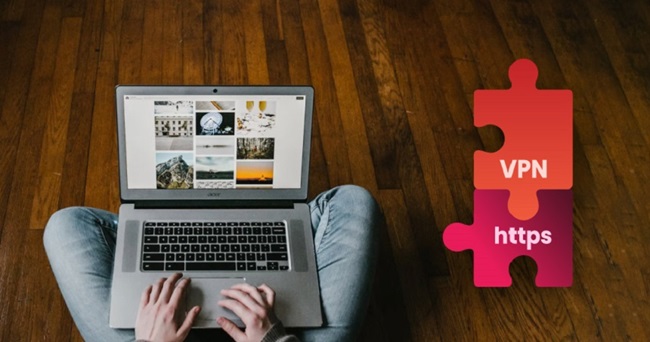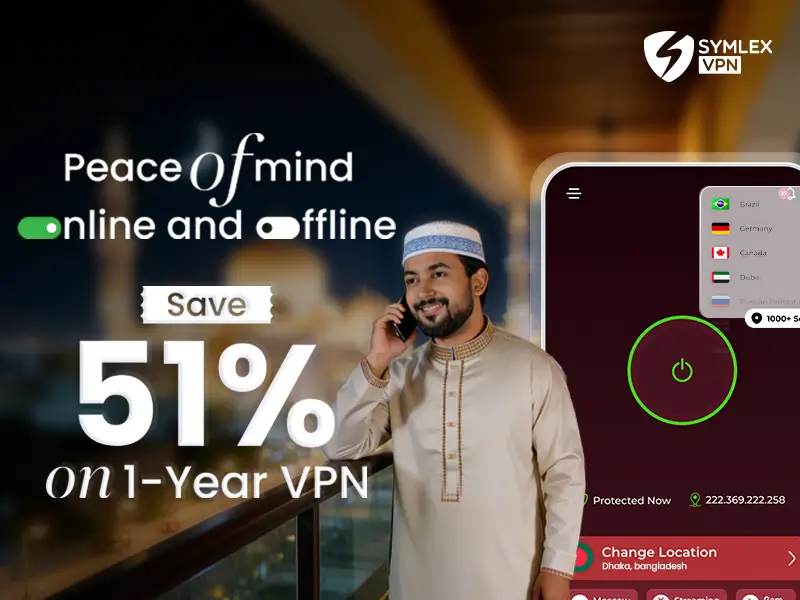
HTTPS vs. VPN: What Is the Difference? Complete Guide!
- January 16, 2022
- 10 minutes Read
- Security & Privacy
HTTPS is a more secure version of Hypertext Transfer Protocol (HTTP). HTTPS is like an envelope for websites to protect your data, while a VPN is like a secret tunnel that keeps your internet activities hidden from prying eyes.
You may at least once have encountered these words: HTTPS and VPN. All the websites on the internet have the HTTP tag, which refers to the internet protocol to transfer data over the internet, where a VPN is a Virtual Private Network.
Although they are totally different, they serve the same purpose: securing your internet browsing. So, you’ll need both HTTPS vs VPN to work side by side to provide the ultimate security for you. Now, let’s dive deeper into the HTTPS vs VPN debate.
Source: Snap Search
HTTPS vs VPN: Short Overview
Here’s a comparison table between HTTPS and VPN.
| HTTPS | VPN |
| Secure data transfer over the internet | Secures the entire network |
| Data is encrypted between your browser and website | Data is encrypted between the client and the VPN server |
| Protects data during transmission | It offers an additional layer of security, hiding your IP address |
| It provides limited privacy and doesn’t hide your actual IP address | Enhanced privacy by hiding your IP address and encrypting all traffic |
| Limited ability to bypass geo-restrictions and censorship | Effective in bypassing geo-restrictions and censorship |
| Generally free for website users | Often involves subscription fees for reliable services |
What is a VPN?
A Virtual Private Network (VPN) is an internet service that provides security, privacy, and encryption. The main purpose of a VPN is to provide a secure connection to the internet, help you bypass geo-blocks, and unblock restricted websites from anywhere.
It ensures your internet browsing, online transactions, gaming, etc., is secure by hiding your IP address and protecting you from all cyber threats.
Source: Forscope
Am I Secure If I Use a VPN?
VPNs secure your internet connection by hiding your IP address. Almost all top VPNs, like Symlex VPN, offer AES-256-bit encryption for maximum security and privacy. Other security features include a kill switch and split tunneling. Kill switch protects you from IP leaks, and split tunneling gives you more controlled access.
Does VPN Really Encrypt Data?
VPNs encrypt your data with military-grade AES-256-bit encryption, which is unbreakable even with the best supercomputers. It encrypts the data so that even if someone gets access to it (which is not possible), it will be undecipherable.
Does a VPN Protect You On an Unsecured Website?
If the website supports HTTPS, then it means that the transfer is secure. VPNs change your IP address and create a secure tunnel between you and the internet. However, a VPN cannot protect you from phishing or malware attacks.
How Do I Know If My VPN Is Safe?
If your VPN offers military-grade AES-256 bit encryption with no logs policy, you can trust your VPN service provider. It should also have privacy features like a kill switch, split tunneling, no logging policy, built-in adblocker, and secure protocols.
Why Does a Website Say I Need a VPN?
Without a VPN, your data and internet browsing are vulnerable to hacking attacks, government surveillance, and data leaks. So, if a website says you need a VPN, that indicates you must use the service with a VPN connection. (e.g., torrent sites)
Can Websites Know I am Using a VPN?
Websites can use cookies and other tracking methods to identify your browser and track your activity across the web. If you use a VPN, your IP address will change, but your browser fingerprint may remain the same, which could be used to identify you.
Simply put, yes, websites may know that you’re using a VPN, and sometimes you may come across messages like “VPN/Proxy detected.” You can browse, clean your browser cache, and browse from incognito mode.
What Does a VPN Not Protect You From?
A VPN does not protect you from everything. Here are some things that a VPN does not protect you from:
- Phishing websites
- Downloading malwares
- Cookies, cache, and tracking
- Browser fingerprinting
- VPN blocking software
- Unencrypted HTTP websites
Why Can’t I Access A Website Without a VPN?
If you can’t access a website without a vpn, that means your ISP has blocked the sites, or it’s restricted from accessing in your country. In many countries, sites like Netflix, Facebook, and YouTube are blocked for political or religious reasons. You cannot access these blocked websites in your country without a VPN.
Why Do Websites Not Work With VPNs?
Some websites may not work even with VPNs connected. This means the website may be using a VPN blocking mechanism, or it’s blocking the IP address you’re using. It could also mean the website’s SSL certificate is expired or there’s a DNS leak.
Why Should I Turn Off My VPN?
There are situations where you may need to avoid using a VPN. These are
- When you are traveling to a country where VPN use is illegal.
- If your workplace or school has rules or policies against using VPNs.
- If you’re facing a slower connection speed using a VPN.
- If the sites you’re trying to access block VPN connections.
How Do I Stop Websites From Knowing You Have a VPN?
To stop websites from knowing you have a VPN, use a good paid VPN with strong encryption and DNS leak protection. A good VPN will prevent websites from detecting your original IP address, and a DNS leak will ensure you are undetectable.
Will I Get Banned For Using a VPN?
No, using a VPN doesn’t get you banned. However, in some cases, like games or websites, if the system detects you’re using a VPN, you can get banned by violating the terms of service. So, be cautious regarding the VPN usage policy.
How Much Does a VPN Cost Per Month?
Price ranges of VPNs vary from provider to provider. Symlex VPN provides the most competitive pricing in the market, affordable for anyone. Symlex VPN only costs you $7.99 per month and only $2.79/month when you buy 1-year package.
What is HTTPS?
HTTPS stands for Hypertext Transfer Protocol (HTTP), but a secure version of the protocol (S in the HTTPS refers to ‘’Secure’’). It is generally used on the Internet to transmit data over a computer network safely and securely, unlike HTTP.
Source: iTopVPN
In HTTPS, either Transport Layer Security (TLS) or Secure Sockets Layer (SSL) is used to encrypt the communication protocol. As a result, the protocol is sometimes known as HTTP over TLS or HTTP over SSL.
The HTTPS protocol enables website users to securely communicate sensitive data over the Internet, including credit card numbers, financial information, and login credentials. In addition, HTTPS is critical for online security activities such as shopping, banking, and remote work since it comes with strong encryption.
Summary: HTTPS is the secure version of the HTTP protocol. It protects the data transfer with either TLS or SSL encryption.
Do you still need a VPN if you use HTTPS?
Honestly speaking, you need both HTTPS vs VPN for maximum security. HTTPS only encrypts the data transfer between your browser and the website. VPNs, on the other hand, encrypt your entire network, which is why you need both HTTPS vs VPN.
Do I need HTTPS Everywhere Anymore?
HTTPS Everywhere is an awesome browser extension that automatically converts HTTP websites to HTTPS. Although the extension has been discontinued, there are other alternative extensions available, such as Smart HTTPS.
Why Not Always Use HTTPS?
HTTPS can be more resource-intensive than HTTP, leading to slower page load times and higher server costs. Also, HTTPS requires a valid SSL certificate, which can be expensive and time-consuming to obtain and maintain. Moreover,
What Happens If You Don’t Use HTTPS?
If you don’t use HTTPS, the data transfer between the website and your browsing can be compromised or intercepted. HTTP is unencrypted and potentially dangerous as a website of sensitive information, payment gateway, or directory.
Does HTTPS Protect You From Hackers?
Yes, HTTPS protects you from hackers by securing data transfer between your browser and websites. However, your network may still be vulnerable to data leaks or cyber-attacks if you’re not using a VPN.
5 Reasons You Should Use Both VPN and HTTPS
VPNs have their way of protecting you, and HTTPS has its security standards. Here are the reasons why you should use HTTPS vs VPN combined.
- VPNs Hide Your Online Identity
Unlike e HTTP, VPNs hide your IP address and connect you to a virtual location. All the connection then gets transferred through this secure tunnel with a new IP address. In this way, the websites you browse cannot detect your actual location. Thus, VPNs help to fight geo-blocking and internet censorship, unlocking the internet for you.
- VPN Protects Your Online Privacy
Even though they provide encryption, more than HTTP is needed and might be vulnerable, but a VPN can solve this issue. HTTPS provides end-to-end encryption, but a VPN, on the other hand, encrypts your device to the VPN server. So, while HTTPS encrypts only the communication between your browser and the website, a VPN protects all data from the device to the Internet.
- VPNs Can Bypass Geo-blocking/Censorship
As we have stated before, VPNs can hide IP addresses; it also enable you to access content from any region you like, as the ISP cannot detect exactly where you are. For example, if you are linking to a USA server, your ISP or the tracker will see you are in the USA, whereas you might be in the UAE.
- Vpn Protects You from DNS Leaks/Hijacking
While HTTPS is a good way to keep your traffic secure, one drawback is. It takes a DNS server to convert your URL into an IP address when you enter it in your browser’s address bar. This DNS request is frequently unencrypted, as well.
This means that somebody on your network can keep tabs on your DNS requests and see what websites you visit while connected to the Internet. As a result, your Internet service provider (ISP) has access to your surfing history because they often provide the DNS server for you. But VPNs can be a solution to the problem.
When you use a VPN, all the DNS requests go through a secure DNS server. This way, your ISP or government can’t see which websites you’re visiting.
- Vpn Works Everywhere
HTTP works only in your web browsers, but a VPN will always be active across almost any platform you want and secure your entire network. Also, remember some websites may not support HTTPS and break if you forcefully redirect it to HTTPS.
Why Millions of People Opt for Symlex VPN?
After testing some VPNs, we have seen that Symlex VPN meets our criteria. You need the most secure VPN, and Symlex VPN is just your solution. They have a strict no-log policy, which makes it an even better option for your privacy and security needs.
If you try to access regionally blocked content, Symlex VPN is the best one to bypass geo-restriction without compromising your privacy. From Hotstar to the USA Netflix library, everything is pretty accessible. To use the app, you can download it for any device. It is available for Android, iOS, Windows, and recently added MacOS.
The opportunity to protect yourself in the vast platform and to use both HTTPS and VPN is in the palm of your hands. Try Symlex VPN today, 7 days risk-free. Download now!
![Ultimate White Label VPN Business Guide 2026 [Cost & ROI]](https://symlexvpn.com/wp-content/uploads/2026/01/Ultimate-White-Label-VPN-Business-Guide-2025-Cost-ROI_2-376x114.webp)






